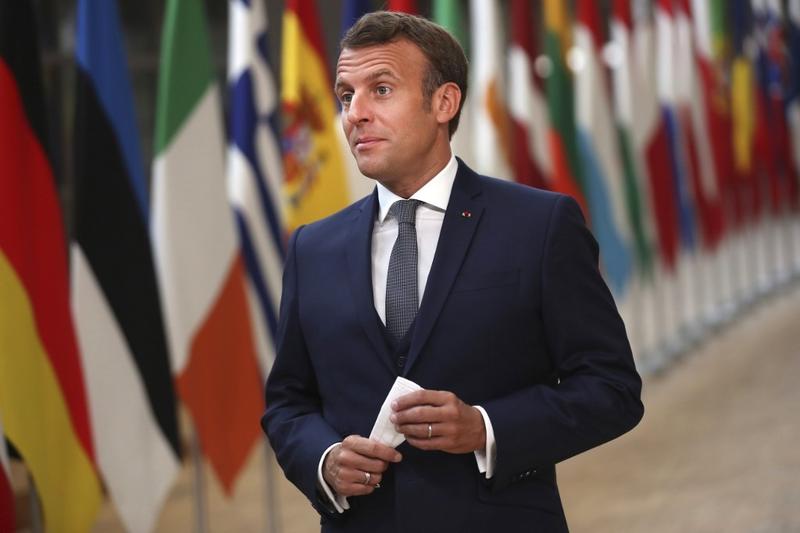 French President Emmanuel Macron makes a statement as he arrives for a European Union Council in Brussels on July 17, 2020, the leaders of the European Union hold their first face-to-face summit over a post-virus economic rescue plan. (PHOTO / AFP)
French President Emmanuel Macron makes a statement as he arrives for a European Union Council in Brussels on July 17, 2020, the leaders of the European Union hold their first face-to-face summit over a post-virus economic rescue plan. (PHOTO / AFP)
BRUSSELS / PARIS - European Union leaders gathered on Friday for crunch summit talks on a multi-billion-euro plan to breathe life into their economies, their first face-to-face summit since the coronavirus pandemic plunged the bloc into its latest crisis.
“It is a moment of truth and ambition for Europe,” French President Emmanuel Macron said as he arrived for the meeting of 27 leaders in Brussels after weeks of tension over the scale and scope of the rescue fund.
“It is our European project that is at stake here. I am confident but cautious.”
Dutch opposition and a threat of a Hungarian veto weigh on chances for a deal on the EU’s 2021-27 budget, envisaged at slightly above 1 trillion euros (US$1.1 trillion), and an attached new recovery fund worth 750 billion euros meant to help rebuild the southern economies affected the most by the crisis.
It is a moment of truth and ambition for Europe. It is our European project that is at stake here. I am confident but cautious.
Emmanuel Macron, President, France
ALSO READ: EU ties key for global economy
The 27 EU heads will meet in a room equipped with hand sanitisers, and disinfected headsets to provide translation, in the Brussels EU headquarters, which will unusually be devoid of journalists, as a health precaution.
The summit is scheduled to run for two days, though officials said it could spill into Sunday if an agreement remains elusive. Luxembourg Prime Minister Xavier Bettel told Reuters he had brought an extra set of clothes just in case.
The stakes are high with EU economies in free fall, immediate relief measures such as short-time work schemes running out this summer and paving the way for what some fear will be an autumn of deep economic malaise and discontent.
That would risk damaging the EU, already struggling with the protracted saga of Brexit and bruised by past crises, from the financial meltdown to migration feuds.
That in turn could exposing it to more eurosceptic, nationalist and protectionist forces and weaken its standing against the United States or Russia.
“Everybody knows that autumn will be difficult,” said a senior government official in one EU state. “It would be really good for Europe to send a signal to all that we are united.”
After months of feuds over medicines, medical gear, border closures and money to respond to the coronavirus, the EU has already agreed a half-a-trillion-euro scheme to cushion the first hit of the crisis, and narrowed some differences over how to finance kick-starting economic growth over the long term.
READ MORE: New EU leaders face tough task of reviving bloc's economy
Dutch Prime Minister Mark Rutte is the main holdout among a thrifty camp of northern, wealthy EU countries demanding a smaller overall package, economic reforms as a condition for funds, an expanded vetting process for granting aid, and keeping rebates for net payers to the bloc’s joint coffers.
The high-debt, ailing southern countries, including Italy and Spain, want the recovery financing to come as free grants rather than repayable loans, while Hungary has threatened to veto the whole package over a proposed new mechanism to freeze payouts for countries undercutting democratic values.
Among the other sticking points are when to make the recovery money available and for how long; how to repay debt to be acquired by the bloc’s executive European Commission to collect these extra funds; and how much should be channelled to green projects that help the EU to meet its emissions targets.


